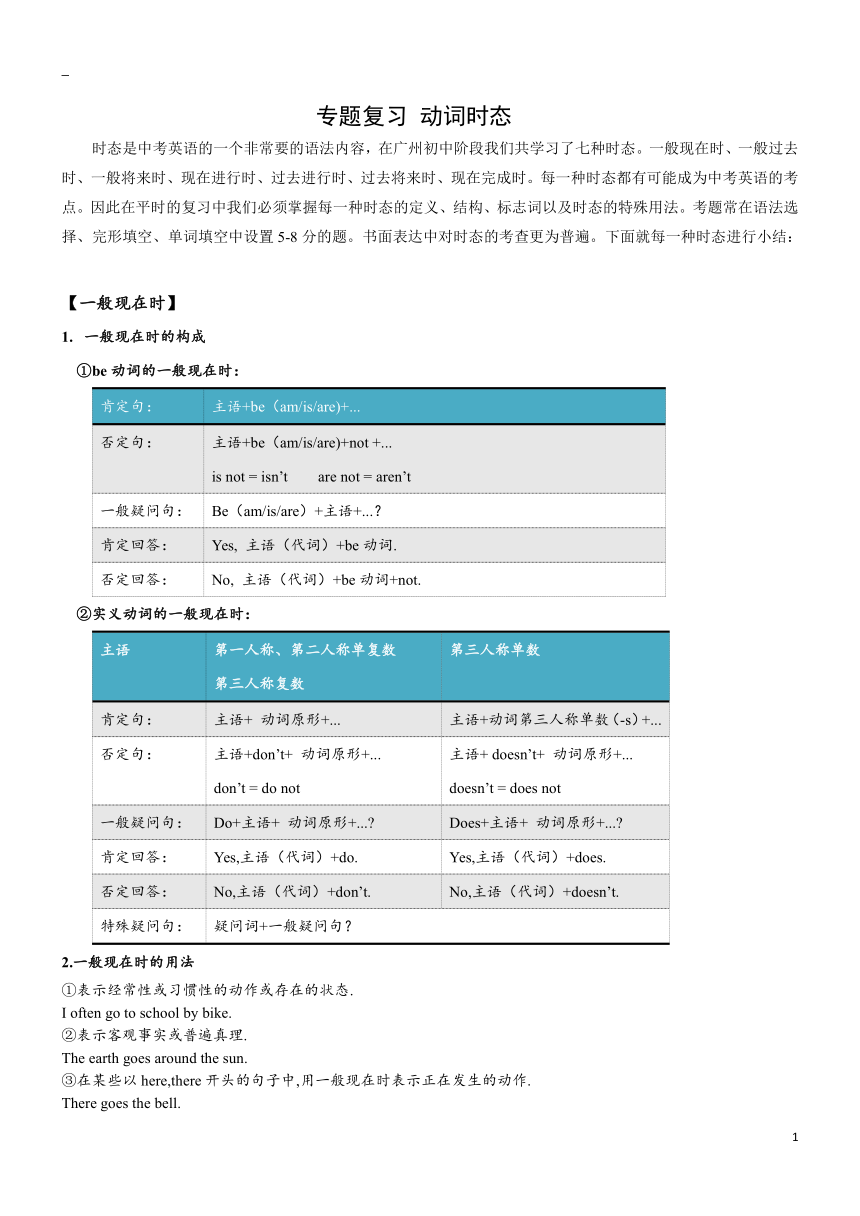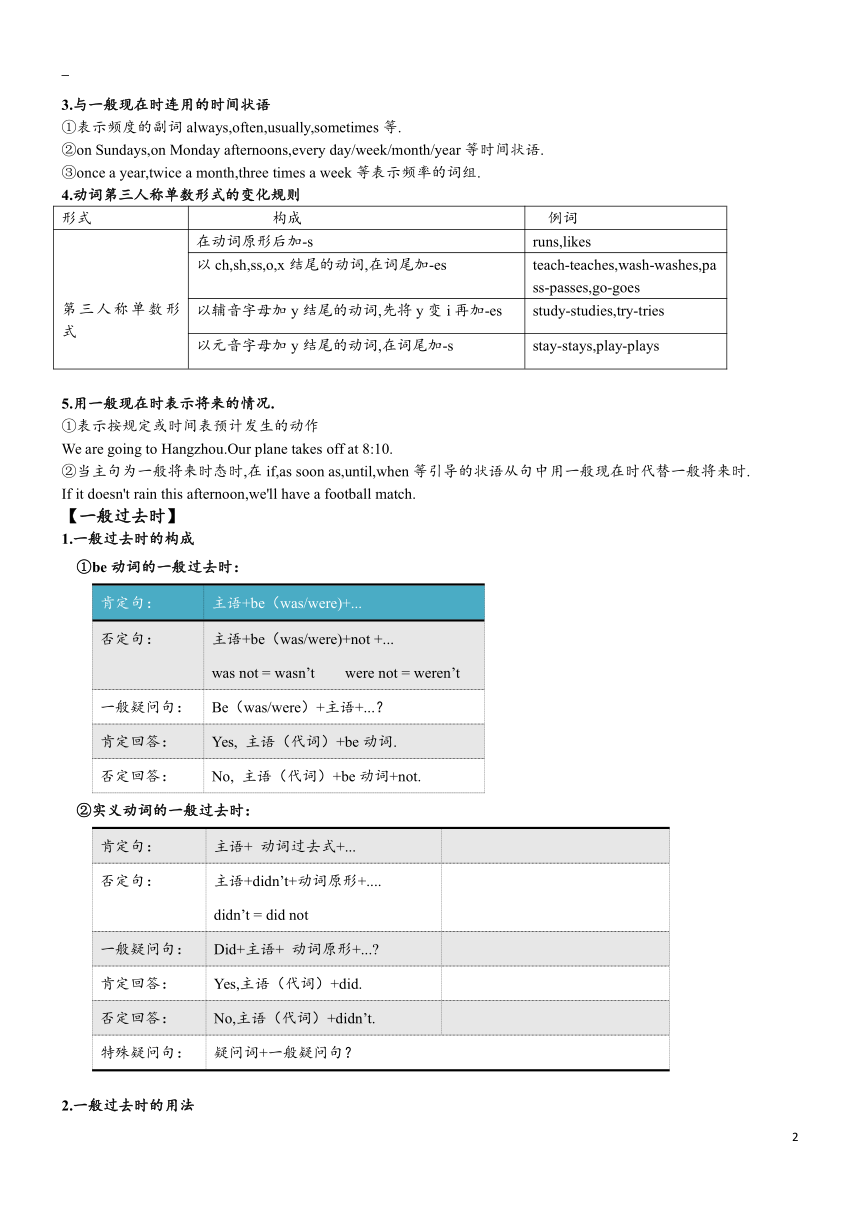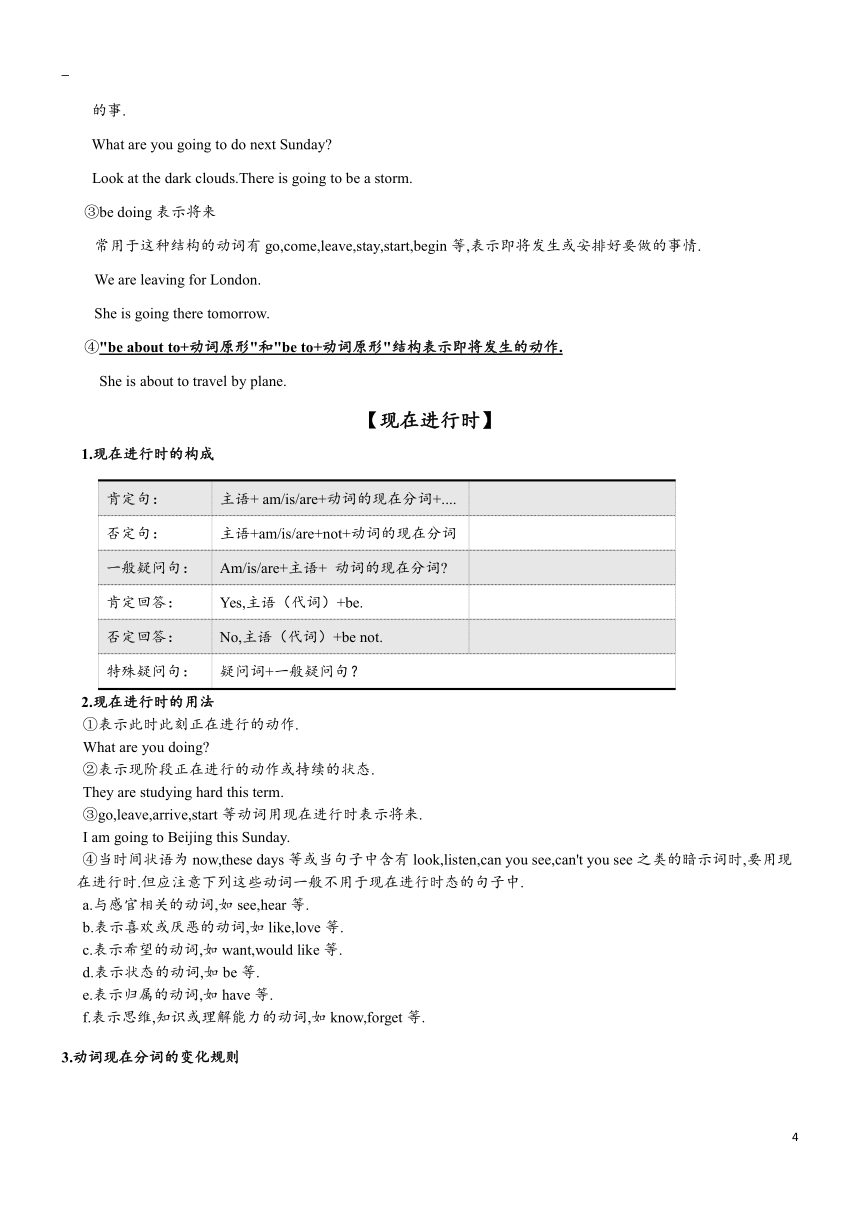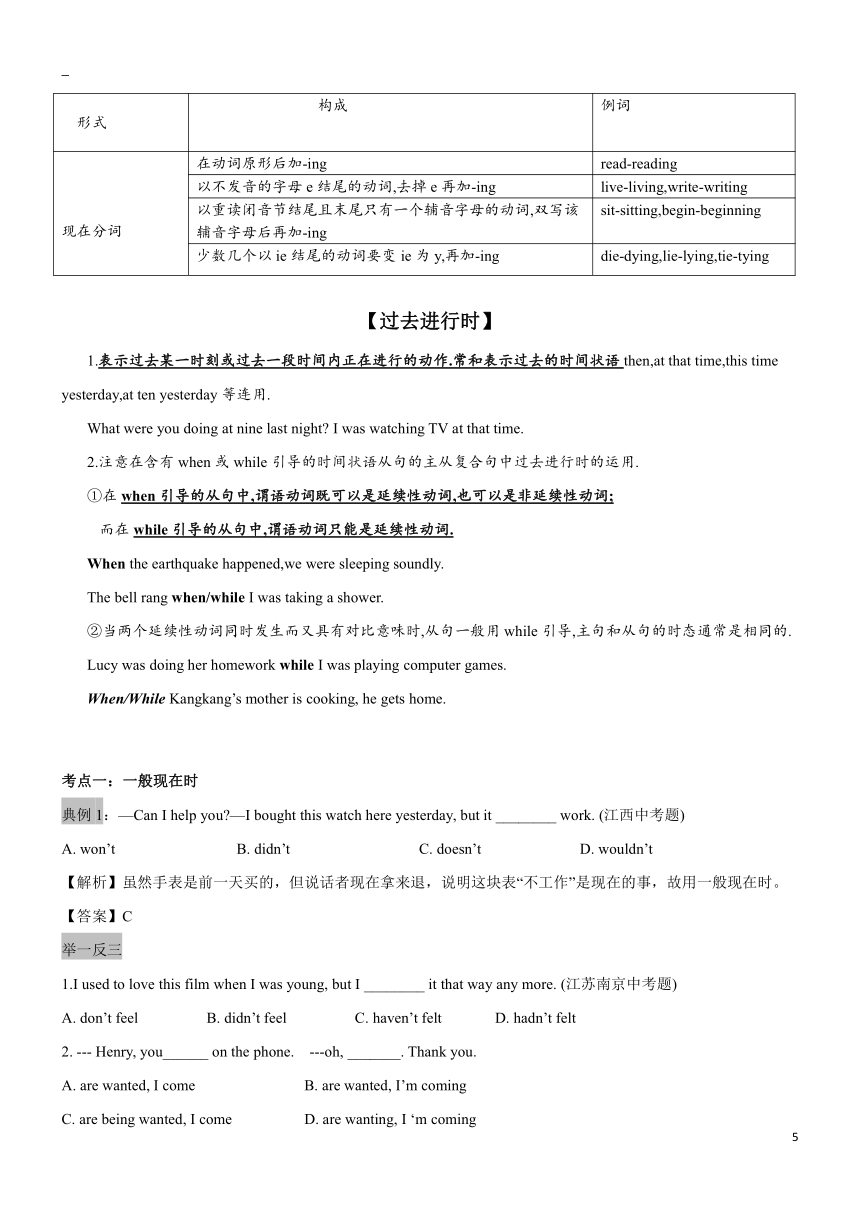2020年中考语法专项复习 动词时态及练习题
文档属性
| 名称 | 2020年中考语法专项复习 动词时态及练习题 |  | |
| 格式 | zip | ||
| 文件大小 | 1.1MB | ||
| 资源类型 | 教案 | ||
| 版本资源 | 通用版 | ||
| 科目 | 英语 | ||
| 更新时间 | 2019-10-09 16:09:10 | ||
图片预览





文档简介
专题复习 动词时态
时态是中考英语的一个非常要的语法内容,在广州初中阶段我们共学习了七种时态。一般现在时、一般过去时、一般将来时、现在进行时、过去进行时、过去将来时、现在完成时。每一种时态都有可能成为中考英语的考点。因此在平时的复习中我们必须掌握每一种时态的定义、结构、标志词以及时态的特殊用法。考题常在语法选择、完形填空、单词填空中设置5-8分的题。书面表达中对时态的考查更为普遍。下面就每一种时态进行小结:21世
【一般现在时】
1. 一般现在时的构成
①be动词的一般现在时:
肯定句: 主语+be(am/is/are)+...
否定句: 主语+be(am/is/are)+not +... is not = isn’t are not = aren’t
一般疑问句: Be(am/is/are)+主语+...?
肯定回答: Yes, 主语(代词)+be动词.
否定回答: No, 主语(代词)+be动词+not.
②实义动词的一般现在时:
主语 第一人称、第二人称单复数 第三人称复数 第三人称单数
肯定句: 主语+ 动词原形+... 主语+动词第三人称单数(-s)+...
否定句: 主语+don’t+ 动词原形+... don’t = do not 主语+ doesn’t+ 动词原形+... doesn’t = does not
一般疑问句: Do+主语+ 动词原形+...? Does+主语+ 动词原形+...?
肯定回答: Yes,主语(代词)+do. Yes,主语(代词)+does.
否定回答: No,主语(代词)+don’t. No,主语(代词)+doesn’t.
特殊疑问句: 疑问词+一般疑问句?
2.一般现在时的用法
①表示经常性或习惯性的动作或存在的状态.
I often go to school by bike.
②表示客观事实或普遍真理.
The earth goes around the sun.
③在某些以here,there开头的句子中,用一般现在时表示正在发生的动作.
There goes the bell.
3.与一般现在时连用的时间状语
①表示频度的副词always,often,usually,sometimes等.
②on Sundays,on Monday afternoons,every day/week/month/year等时间状语.
③once a year,twice a month,three times a week等表示频率的词组.
4.动词第三人称单数形式的变化规则
形式 构成 例词
第三人称单数形式 在动词原形后加-s runs,likes
以ch,sh,ss,o,x结尾的动词,在词尾加-es teach-teaches,wash-washes,pass-passes,go-goes
以辅音字母加y结尾的动词,先将y变i再加-es study-studies,try-tries
以元音字母加y结尾的动词,在词尾加-s stay-stays,play-plays
5.用一般现在时表示将来的情况.
①表示按规定或时间表预计发生的动作
We are going to Hangzhou.Our plane takes off at 8:10.
②当主句为一般将来时态时,在if,as soon as,until,when等引导的状语从句中用一般现在时代替一般将来时.
If it doesn't rain this afternoon,we'll have a football match.
【一般过去时】
1.一般过去时的构成
①be动词的一般过去时:
肯定句: 主语+be(was/were)+...
否定句: 主语+be(was/were)+not +... was not = wasn’t were not = weren’t
一般疑问句: Be(was/were)+主语+...?
肯定回答: Yes, 主语(代词)+be动词.
否定回答: No, 主语(代词)+be动词+not.
②实义动词的一般过去时:
肯定句: 主语+ 动词过去式+...
否定句: 主语+didn’t+动词原形+.... didn’t = did not
一般疑问句: Did+主语+ 动词原形+...?
肯定回答: Yes,主语(代词)+did.
否定回答: No,主语(代词)+didn’t.
特殊疑问句: 疑问词+一般疑问句?
2.一般过去时的用法
①表示过去某时间发生的动作或存在的状态.
I got up at six this morning.
We visited the factory last week.
②表示过去的习惯或经常发生的动作
When I was in the countryside,I often swam in the river.
3.和一般过去时连用的时间状语
last night,yesterday,last week,some years ago,in 1995,in the past,the other day等.
【一般将来时】
1.一般将来时的构成
①will形式
肯定句: 主语+ will+动词原形+....
否定句: 主语+won't+动词原形+.... won't = will not
一般疑问句: Will+主语+ 动词原形+...?
肯定回答: Yes,主语(代词)+will.
否定回答: No,主语(代词)+won’t.
特殊疑问句: 疑问词+一般疑问句?
②be going to
肯定句: 主语+ be going to+动词原形+....
否定句: 主语+be not going to+动词原形+....
一般疑问句: be going to+主语+ 动词原形+...?
肯定回答: Yes,主语(代词)+be.
否定回答: No,主语(代词)+be not.
特殊疑问句: 疑问词+一般疑问句?
2.一般将来时的用法.
①表示将来发生的动作或存在的状态
They will leave for Shanghai next week.
Will you be back in two days?
②"be going to+动词原形"表示计划,打算做某事,还可表示已决定的,很可能发生的事或有某种迹象表明要发生的事.
What are you going to do next Sunday?
Look at the dark clouds.There is going to be a storm.
③be doing表示将来
常用于这种结构的动词有go,come,leave,stay,start,begin等,表示即将发生或安排好要做的事情.
We are leaving for London.
She is going there tomorrow.
④"be about to+动词原形"和"be to+动词原形"结构表示即将发生的动作.
She is about to travel by plane.
【现在进行时】
1.现在进行时的构成
肯定句: 主语+ am/is/are+动词的现在分词+....
否定句: 主语+am/is/are+not+动词的现在分词
一般疑问句: Am/is/are+主语+ 动词的现在分词?
肯定回答: Yes,主语(代词)+be.
否定回答: No,主语(代词)+be not.
特殊疑问句: 疑问词+一般疑问句?
2.现在进行时的用法
①表示此时此刻正在进行的动作.
What are you doing?
②表示现阶段正在进行的动作或持续的状态.
They are studying hard this term.
③go,leave,arrive,start等动词用现在进行时表示将来.
I am going to Beijing this Sunday.
④当时间状语为now,these days等或当句子中含有look,listen,can you see,can't you see之类的暗示词时,要用现在进行时.但应注意下列这些动词一般不用于现在进行时态的句子中.
a.与感官相关的动词,如see,hear等.
b.表示喜欢或厌恶的动词,如like,love等.
c.表示希望的动词,如want,would like等.
d.表示状态的动词,如be等.
e.表示归属的动词,如have等.
f.表示思维,知识或理解能力的动词,如know,forget等.
3.动词现在分词的变化规则
形式 构成 例词
现在分词 在动词原形后加-ing read-reading
以不发音的字母e结尾的动词,去掉e再加-ing live-living,write-writing
以重读闭音节结尾且末尾只有一个辅音字母的动词,双写该辅音字母后再加-ing sit-sitting,begin-beginning
少数几个以ie结尾的动词要变ie为y,再加-ing die-dying,lie-lying,tie-tying
【过去进行时】
1.表示过去某一时刻或过去一段时间内正在进行的动作.常和表示过去的时间状语then,at that time,this time yesterday,at ten yesterday等连用.
What were you doing at nine last night? I was watching TV at that time.
2.注意在含有when或while引导的时间状语从句的主从复合句中过去进行时的运用.
①在when引导的从句中,谓语动词既可以是延续性动词,也可以是非延续性动词;
而在while引导的从句中,谓语动词只能是延续性动词.
When the earthquake happened,we were sleeping soundly.
The bell rang when/while I was taking a shower.
②当两个延续性动词同时发生而又具有对比意味时,从句一般用while引导,主句和从句的时态通常是相同的.
Lucy was doing her homework while I was playing computer games.
When/While Kangkang’s mother is cooking, he gets home.
考点一:一般现在时
典例1:—Can I help you?—I bought this watch here yesterday, but it ________ work. (江西中考题)
A. won’t B. didn’t C. doesn’t D. wouldn’t
【解析】虽然手表是前一天买的,但说话者现在拿来退,说明这块表“不工作”是现在的事,故用一般现在时。
【答案】C
举一反三
1.I used to love this film when I was young, but I ________ it that way any more. (江苏南京中考题)
A. don’t feel B. didn’t feel C. haven’t felt D. hadn’t felt21·cn·jy·com
2. --- Henry, you______ on the phone. ---oh, _______. Thank you.
A. are wanted, I come B. are wanted, I’m coming
C. are being wanted, I come D. are wanting, I ‘m coming
3. --- Tomorrow will be Father’s Day. What will you do for your father?
--- I will say “I love you, Daddy” as soon as he _____up.
A. will wake B. wake C. wakes D. woke
考点二:一般过去时
典例2:I ________ the wrong thing. Can I use your eraser? (河北中考题)
A. write B. wrote C. am writing D. will write
【解析】说话者要向对方借用橡皮擦,说明写错字的事已经发生了,故用一般过去时。
【答案】B
举一反三
1.They ________ her to the party, so she was very happy. (北京中考题)
A. invite B. invited C. will invite D. are inviting
2. —When _______ your mother _______ you that blue dress,Mary?
???? —Sorry,I realy can’t remember.
A.does;buy B.has;bought C.had;bought D.did;buy
3. --- How did the accident happen?
--- It _____difficult to see the road because it _______.
A.was, was raining B. is, has rained C. is, is raining D. will be, will rain
考点三:一般将来时
典例3:Attention, please. There ________ a football game between China and Korea this evening. (山东淄博中考题)
A. is going to be B. has been C. has D. will have
【解析】答案选A。根据句中的时间状语this evening(今天晚上)可知,句子应用一般将来时,故可排除B和C;又因为there be的将来时态可以是there will be或there is going to be,但不能是there will have或there is going to have,故可排除D。
【答案】A
举一反三
1.If you ________ carefully, you ________ the report well. (广州中考题)
A. will listen; will be understood B. will listen; understand
C. listen; will understand D. listen; understand
2. I don’t know when Jim _______. I’ll meet him at the airport when he _______.
A. will return; return B. returns; will return
C. returned; returned D. will return; returns.
考点四:现在进行时
典例4:—Alice, turn down the TV, please. I ________ on the phone.
—Oh, sorry. (安徽中考题)
A. have talked B. talked C. am talking D. talk
【解析】说话者叫Alice把电视机声音关小,说明他当时正在打电话,即用现在进行时。
【答案】C
举一反三
1.It ________ outside. You’d better take an umbrella with you. (江西中考题)
A. rains B. is raining C. rained D. has rained
2. --- Listen. Who ______in the next room?--- It maybe Mr Lee.
A.sings B. is singing C. sang D. does sing
考点五:过去进行时
典例6:—What did the teacher say just now?
—Sorry. I didn’t catch it. I________something else.
A.think B.will think C.was thinking D.had thought
【解析】该题的正确答案为C。该题必须根据上下句来理解,第二句所要表达的意思是“刚才老师讲话的时候我在想别的事情。”即表达在过去某一时间发生的动作,所以要用过去进行时was thinking。
【答案】C
举一反三
1.—What ______ when the earthquake (地震) happened on May 12th ?
—Er, I was having a geography class in the classroom.
A. are you doing B. did you do C. were you doing
2.--- What _____your father doing at eight yesterday evening, Sandy?
--- Let me see…Oh, he was_____ a newspaper.
A. was, reading B. were, watching C. was, looking D. were, seeing
种类 意义 构成特点 时间标志词 例句
Ⅰ.单项填空
1.[2019·乐山]—You’d better take an umbrella.The weather report says it in the afternoon.?
—Thank you.I will put one in my bag.
A.will rain B.rains C.is raining
2.[2019·温州]—Linda, Dad has finished his work and we to the gym to pick you up.?
—Thank you, Mum.
A.drive B.drove
C.have driven D.are driving
3.[2019·天津]—What is your plan for next weekend, Lingling?
—I volunteer work in the museum.?
A.was doing B.did
C.have done D.am going to do
4.[2019·德阳]Look! The students clean up the city park.?
A.help B.is helping
C.were helping D.are helping
5.[2019·滨州]—I called you last night, but nobody answered.Where were you then?
—Oh, I my pet dog in my yard.?
A.walked B.was walking
C.am walking D.will walk
6.[2019·遂宁]—Where is your uncle?
—He America and he New York for two weeks.?
A.has been to; has been in
B.has gone to; will stay in
C.has been in; has been to
D.has stayed in; has gone to
7.[2019·天水]—Were you at home at 9 o’clock last night?
—Yes, I a shower at that time.
A.took B.was taking
C.was taken D.am taking
8.[2019·达州]—Jeff, could you tell me if it tomorrow? If it tomorrow, I will stay at home.?
—It’s reported that it will be sunny; let’s go camping on the Fenghuang mountain.
A.rain; rain B.rains; rain
C.will rain; rains D.will rain; will rain
9.[2019·江西]—I’ve never seen Mr.Taylor before.
—Don’t worry.I him to you before the meeting.?
A.will introduce B.introduced
C.have introduced D.had introduced
10.[2019·桂林]He hasn’t communicated much with his parents since he a mobile phone last year.
A.got B.get C.gets
11.[2019·哈尔滨]When we building the Subway Line 3, it will be easier to travel around the city.
A.finish B.finished C.will finish
12.[2019·广东]My father in a panda protection center for 10 years, so he knows a lot about pandas.
A.was working B.is working
C.has worked D.will work
13.[2019·淮安]—Where are the teachers now?
—In the meeting room.They the meeting for 10 minutes.?
A.have begun B.have been on
C.have had D.have been held
14.[2019·河北]He me his name, but I can’t remember it now.?
A.tells B.will tell
C.told D.is telling
15.[2019·鄂州]—Son, you have never been abroad.I’m worried about you.
—Don’t worry, Mom.As soon as I , I you.
A.will arrive; call B.will arrive; will call
C.arrive; will call D.arrive; call
16.[2019·内江]Tom said he basketball with his classmates from 4:00 to 6:00 yesterday afternoon.?
A.is played B.was playing
C.plays D.had played
17.The TV news reports that there a storm the day after tomorrow.
A.is B.was C.will be D.has been
18.I to the West Lake four times, but I will go there again this summer.
A.have gone B.have been
C.went D.had gone
19. Listen! Mr.Black a talk on robots in the hall.
A.gives B.is giving
C.will give D.gave
20.—Are you a basketball player in your school?
—Yes.I the team 3 years ago.I in it for 3 years.
A.joined; was
B.was joined; am
C.have joined; have been
D.joined; have been
21.—Did you hear the strange noise next door at around 10 o’clock last night?
—No.I my favorite music in my bedroom.
A.listen to B.listened to
C.was listening to D.am listening to
22.—We all went to the cinema except you last night.Why didn’t you come?
—Because I that movie twice.
A.have watched B.had watched
C.was watching D.would watch
23.—Hey, Tom.Let’s go swimming.
—Just a moment.I a message.
A.send B.sent
C.am sending D.have sent
24.Don’t return the video to Peter.I it.
A.don’t watch B.won’t watch
C.haven’t watched D.wasn’t watching
25.—How long she married??
—Since 1980.
A.does; get B.did; get
C.has; got D.has; been
26.We have no more vegetables in the fridge.I and buy some.
A.go B.went
C.will go D.was going
27.Tom said he had never been there, but he .
A.lay B.is lying
C.was lying D.lie
28.—Will you go to the cinema with me tomorrow?
—Sorry, I skating with Tom.
A.go B.went
C.have gone D.will go
29.—Great changes have taken place in our hometown over the past years.
—Yeah.Things different when we were young.
A.have been B.are
C.will be D.were
30.—Jerry, have you ever been to the Great Wall?
—Yes.I there with my parents last year.
A.go B.went
C.will go D.have gone
Ⅱ.用括号中所给单词的适当形式填空。
31.[2019·鄂州]Look! The Browns (eat) supper in the kitchen.?
32.[2019·兰州]Li Lei is interested in English and he (watch) BBCNews every day.
33.[2019·宿迁]Uncle Chen (repair) more than five bicycles since last Friday.
34.[2019·北部湾]In the playground, I threw the ball to her and she (catch) it.
35.[2019·大庆]Be sure to let Tom know the news as soon as he (arrive).
36.If he (go) to the party, he’ll have a good time.
37.Mary (talk) on the phone, so I just nodded to her and went away.
38.—Why are you in such a hurry?
—My cousin (wait) for me outside.We are going to see a film together.
39.Betty (watch) television on every Friday evening.
40.Tom with his classmates (succeed) in passing the English exam so far.
【参考答案】
|动词的时态|
Ⅰ.1.A
2.D 考查动词时态。上文的现在完成时态“爸爸已经完成工作”,提示下文用现在进行时态“我们正在开车去体育馆接你”。故选D。
3.D 考查一般将来时。根据上文问句可知,下文描述的是将来计划进行的动作,因此用一般将来时。故选D。
4.D 考查动词时态。句意:看!学生们正在帮助打扫城市公园。根据“Look!”可知应用现在进行时态;主语为students,故选D。
5.B 考查动词时态。句意:“昨天晚上我给你打电话,但没有人接。当时你在哪里?”“噢,我在院子里遛我的宠物狗。”表示过去某一时间正在进行的动作,需用过去进行时。故选B。
6.B 考查动词时态。has been to曾经去过(现在已经回来了,不在那里了);has gone to去某地了(可能已经到了,也可能在去的路上);has been in一直在某地;根据语境排除A、 C两项,再根据关键词“for two weeks”可知,他叔叔将在纽约待两周,故第二个空应用一般将来时。故选B。
7.B 考查过去进行时。句意:“昨晚9点你在家吗?”“是的,那时我正在洗澡。”由时间状语9 o’clock last night可知,过去的时间,要用过去的相应时态,根据语境可知,昨晚九点正在洗澡,要用过去进行时。故选B。
8.C 考查动词时态。第一句if引导宾语从句,由tomorrow可知,用将来时态;后句if引导条件状语从句,用一般现在时表示将来。故选C。
9.A
10.A 考查动词时态。主句是现在完成时态,since引导的时间状语从句中需用一般过去时态。由句末的时间状语last year也可判定应用一般过去时态。故选A。
11.A 考查动词时态。句意:我们完成修建地铁3号线时,环游这个城市将会变得更加简单。根据句中when可知为时间状语从句。时间状语从句中主句为一般将来时,从句要用一般现在时。故选A。
12.C 考查动词时态。句意:我父亲在一个熊猫保护中心工作10年了,所以他对熊猫非常了解。由句意并从for 10 years可知,这里用现在完成时态表达从过去持续到现在的动作。故选C。
13.C 14.C
15.C 考查动词时态。主句表示儿子将要给妈妈打电话,要用一般将来时,而as soon as引导的时间状语从句中要用一般现在时表示将来。故选C。
16.B 考查动词时态。时间是“昨天下午从四点到六点”,时态应该用过去进行时或一般过去时。故选B。
17.C 考查动词时态。根据时间状语“the day after tomorrow”判定应用一般将来时。故选C。
18.B 考查动词时态。根据four times可知表示“去过”,用have been to表达。故选B。
19.B 考查动词时态。listen表示动作正在进行,故要用现在进行时态。故选B。
20.D 考查动词时态。3 years ago是一般过去时的时间状语,故第一个空用一般过去时,且用主动语态;时间状语for 3 years为一段时间,故第二个空用现在完成时。故选D。
21.C 考查动词时态。根据上句中的“around 10 o’clock last night”可以判断该空用过去进行时。故选C。
22.B 23.C 24.C 25.D 26.C 27.C
28.D
29.D 考查动词时态。根据答句中的“when we were young”可知,该句是一般过去时,动词应用过去式。故选D。
30.B 考查动词时态。第二句的时间状语“last year”是一般过去时的标志词,故选went。故选B。
Ⅱ.31.are eating 32.watches
33.has repaired 34.caught 35.arrives
36.goes 37.was talking 38.is waiting
39.watches 40.has succeeded
PAGE
1
同课章节目录
- 词法
- 名词
- 动词和动词短语
- 动词语态
- 动词时态
- 助动词和情态动词
- 非谓语动词
- 冠词
- 代词
- 数词和量词
- 形容词副词及其比较等级
- 介词和介词短语
- 连词和感叹词
- 构词法
- 相似、相近词比较
- 句法
- 陈述句
- 一般疑问句和否定疑问句
- 特殊疑问句及选择疑问句
- 反意疑问句
- 存在句(There be句型)
- 宾语从句
- 定语从句
- 状语从句
- 主谓一致问题
- 简单句
- 并列句
- 复合句
- 主谓一致
- 主、表语从句
- 名词性从句
- 直接引语和间接引语
- 虚拟语气
- 感叹句
- 强调句
- 倒装句
- 祈使句
- 句子的成分
- 句子的分类
- 题型专区
- 单项选择部分
- 易错题
- 完形填空
- 阅读理解
- 词汇练习
- 听说训练
- 句型转换
- 补全对话
- 短文改错
- 翻译
- 书面表达
- 任务型阅读
- 语法填空
- 其他资料
